Displaced 77-year-old Lahaina fire survivor prepares to buy first home through Maui County program
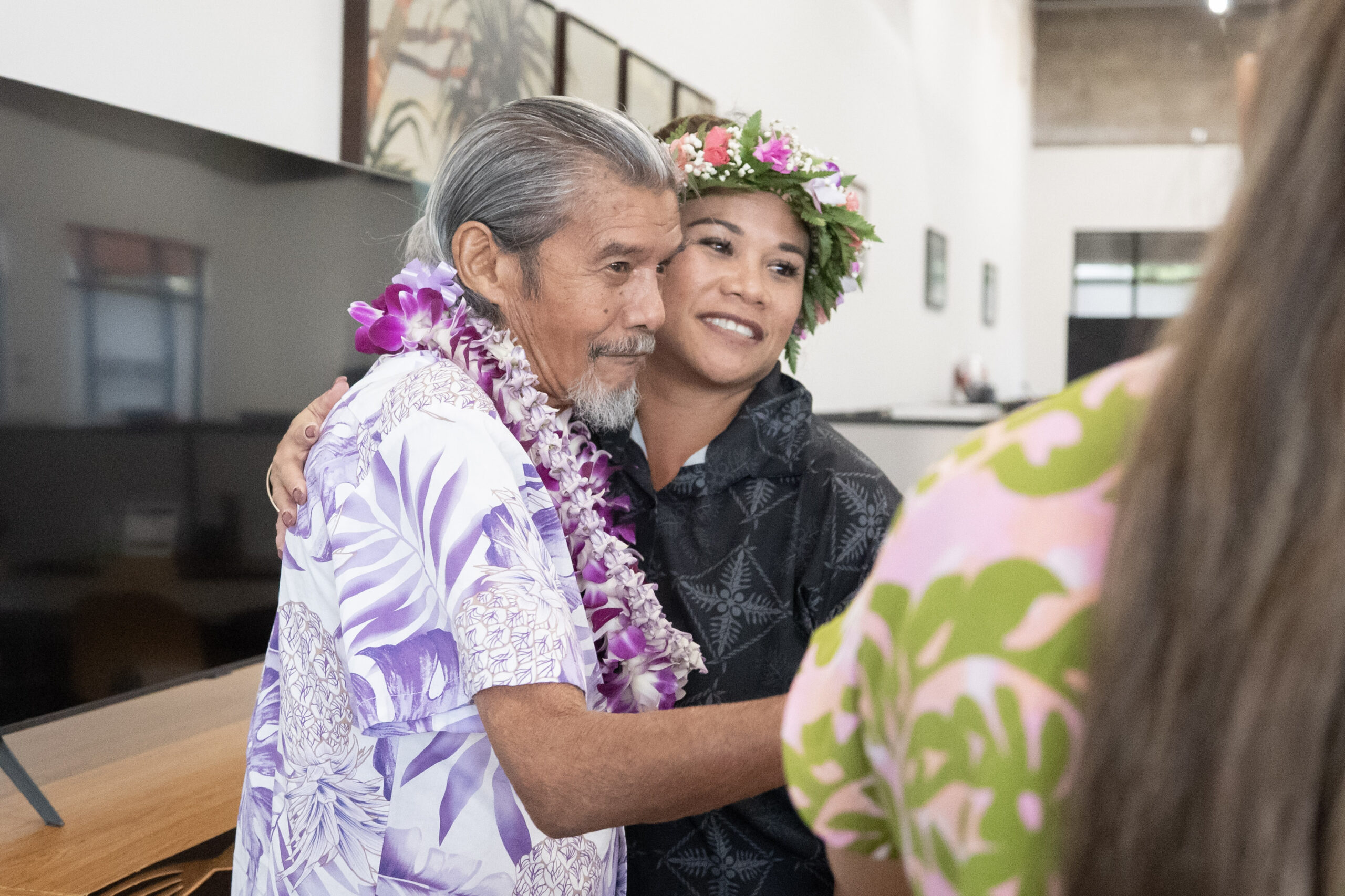
KAHULUI — At 77 years old, George Dacuycuy has never owned a home.
Now he’s on the verge of buying one for the first time through a program meant to help Lahaina residents who lost the homes they were renting in the August 2023 wildfire.
On Monday, Dacuycuy received his official “shopping letter” that will allow him and his 21-year-old grandson to move forward with the purchase of a Pukalani home listed at $975,000 with views of Maui’s north and south shores and plenty of space to grow vegetables.
“Feels real good,” said Dacuycuy, the third applicant to get a letter through Maui County’s Ho‘okumu Hou first-time homebuyers program.
Just a couple of weeks ago, the family feared they’d missed their shot at the home when they couldn’t get approval from the county before the sellers moved off island on Oct. 24. Their challenge to secure the home shows what some survivors have to go through as they navigate a pricey market and a new assistance program that has been flooded with interest.
Since it launched in August, the county’s first-time homebuyers program has drawn 2,945 applications, Office of Recovery Administrator John Smith said at a community meeting in Lahaina last week.
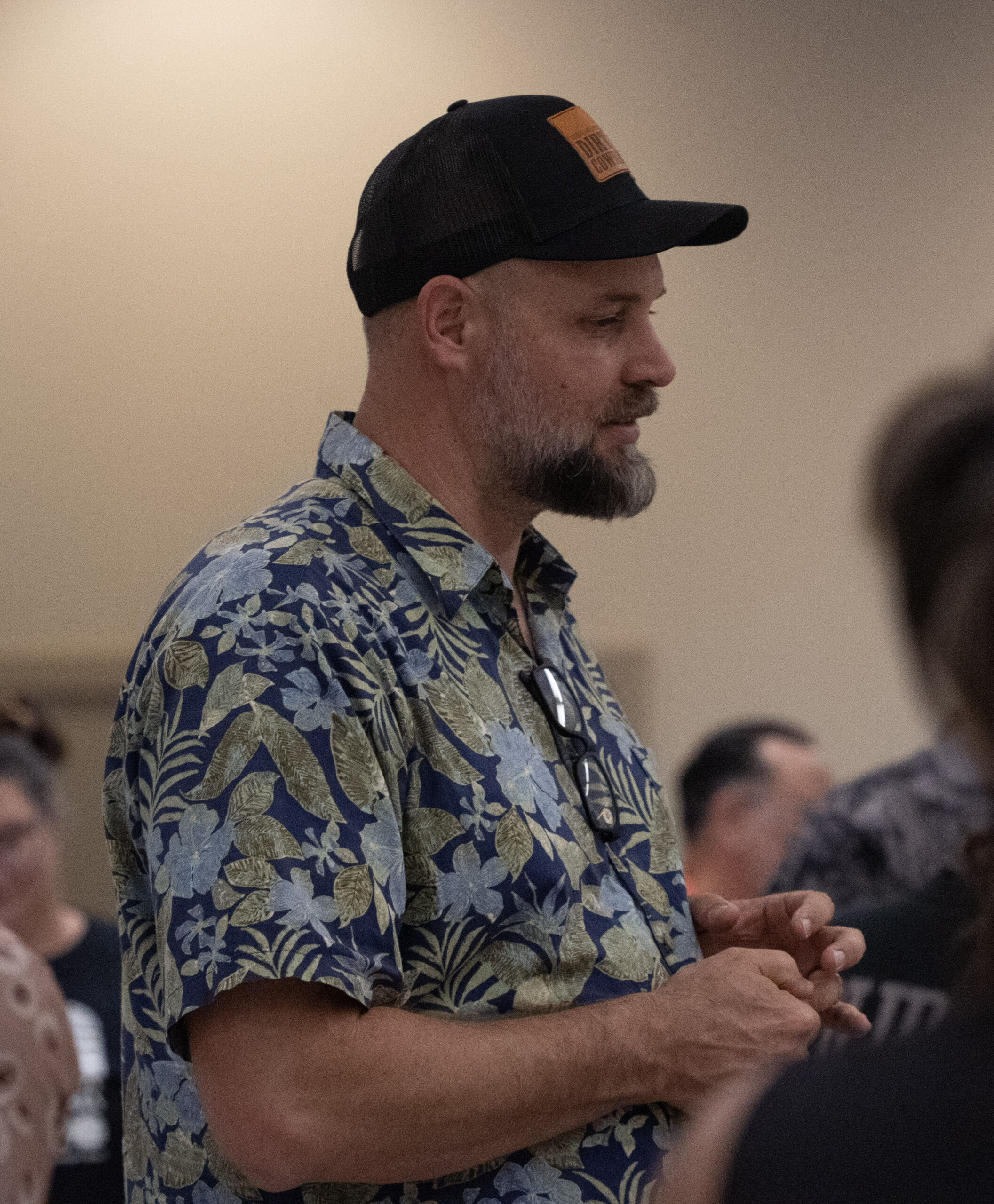
Applications for the program, which offers up to $600,000 in assistance for eligible residents, closed on Sept. 30 largely due to the demand, said Jeannie Sutton of Horne, the company contracted by the county to manage the program, during an interview Oct. 31 with the Hawai‘i Journalism Initiative.
“It is more than we expected, and that’s a great thing for this program, because that means we’re meeting a need in the community,” Smith said during the interview alongside Sutton.
It’s by far the most popular of the county’s fire relief housing initiatives. The program to help residents rebuild their homes has so far received 171 applications, while the program to reimburse people who have already rebuilt their homes has gotten 125.
They’re all backed by a $1.6 billion federal grant that also includes funding for public infrastructure, economic revitalization and other fire recovery needs.
Shortly after the first-time homebuyers program launched in August, Dacuycuy’s daughter Waipuilani Tamayose urged him to apply. Dacuycuy lost his Waine‘e Street rental apartment in the fire, and since June has been living in a temporary unit at ‘Ohana Hope Village in Kahului.
Dacuycuy was used to his independence in Lahaina. At ‘Ohana Hope Village, he longed to walk to Zippy’s for a coffee, a donut and the morning paper. But the project sits at the corner of a busy, multi-lane intersection, and his family has begged him not to cross Maui Veterans Highway. He admits he still did it anyway for occasional trips to Target and Walmart.
When the family came across a three-bedroom, one-and-a-half bedroom home in a Pukalani neighborhood around September, they felt it was the perfect place for Dacuycuy to stay active and safe. There were planter beds where he could grow his own vegetables, which he used to love doing. There was also a handicap-accessible ramp to accommodate his walker and cane — and a wheelchair if the day comes that he needs one.
“He can nourish his body with the fruits of his labor,” Tamayose said. “It’s going to be joyful for him, it’s going to give him that gratification, and it’s going to help with the closure, because all this time he was holding on, I feel like, to the loss, and the suffering.”
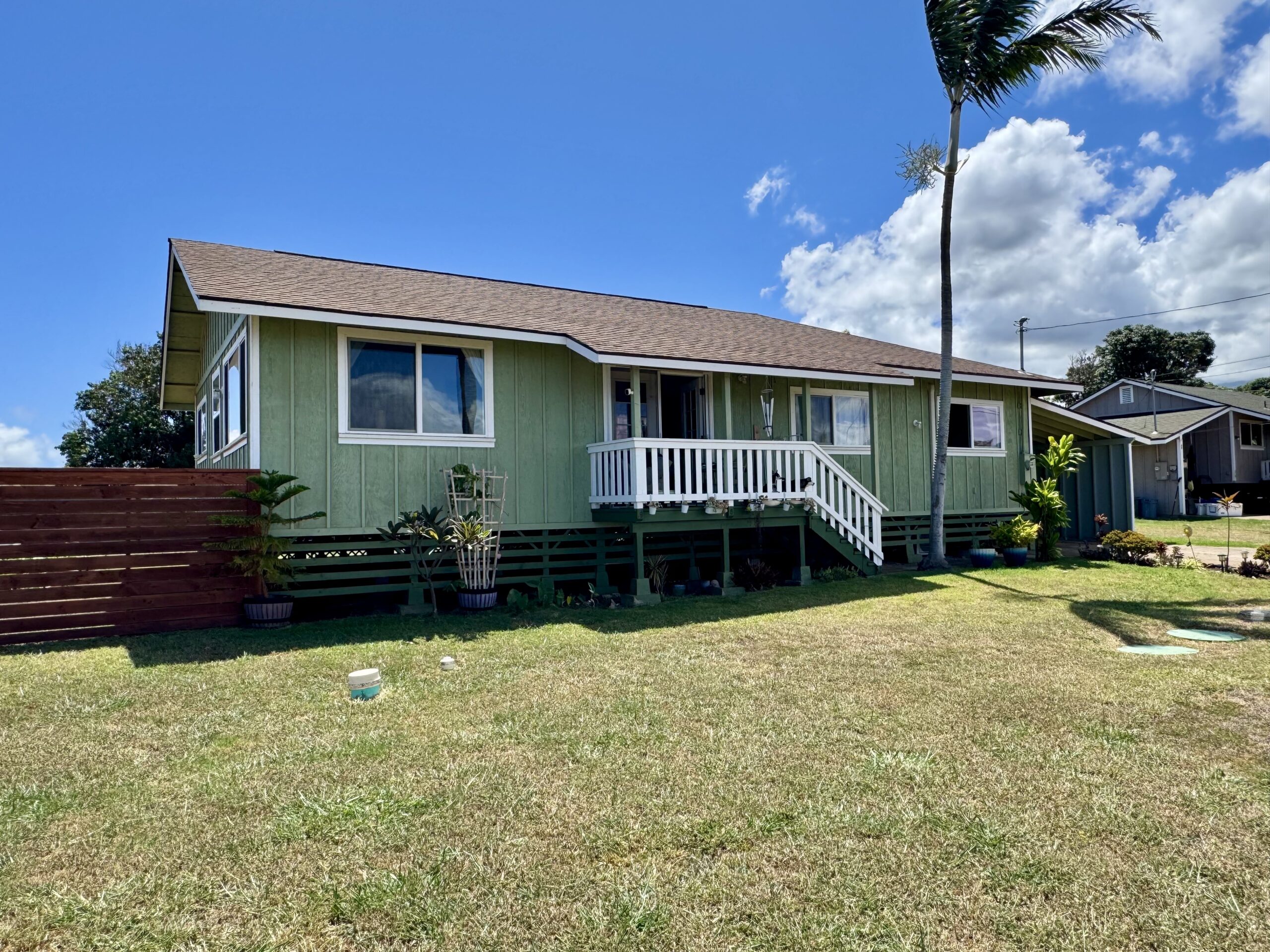
Dacuycuy was born and raised on Moloka‘i and served in the military in the 1970s and ’80s. Tamayose said few veterans at the time knew about veteran home loans, which are much more advertised and promoted today, and her father never ended up buying a place of his own. However, this new opportunity “couldn’t come at a better time.”
With Dacuycuy on a fixed income and unable to qualify for a loan by himself, the family decided to bring in Tamayose’s 21-year-old son Treyson to help buy the home and take care of his grandpa.
But first, they had to outlast the competition. Vanessa Schwabenland of Kōkua Realty, the sellers’ agent, said the 1,268-square-foot home had drawn plenty of interest, with about 50 people coming by for scheduled showings in the six months it was on the market. The home was completely remodeled but it was selling for less than $1 million because it’s a residential condominium, Schwabenland explained.
But when the sellers spotted Dacuycuy’s extended family pull up to the showing with “a kid of every size,” they were convinced. “That’s who I want to sell to,” they told Schwabenland. “This family belongs here.”
The families met for drinks. They got to know each other. The sellers wanted to make it happen. But with plans to move back to California and two mortgages to pay, they gave Dacuycuy a deadline of Oct. 24 to get a commitment from the county or they’d have to withdraw.
Tamayose said the family urged the county to issue the letter before then. She said they’d been told in early October that their application was one of the few to advance as far as they had and just needed final verification.
“It’s an emotional rollercoaster, really,” Tamayose said. “‘Cause one day you’re excited, and then after that, the next day, a couple of days go by … and you’re like pulling teeth and you’re like stressing because you wait for an answer to come back and you don’t get it.”
Oct. 24 came and went. The sellers moved to California, and Tamayose said the family thought “the dream home was forever gone.”
Dacuycuy was holding out for the house: “I just was hoping that we can,” he said.

As the family waited, Smith and Sutton told the Hawai‘i Journalism Initiative that they couldn’t speak to the specifics of applicants’ cases. But, Smith said, “I can assure you that we are working as hard as we can to make sure that, if this is a truly eligible case, that they will get an award letter and things will move forward in a timely basis.”
Smith added that if people move forward too quickly, “they can actually inadvertently hurt themselves, and we want to make sure that that doesn’t happen.”
Because the funding comes from the U.S. Department of Housing and Urban Development, Smith and Sutton explained that the county has to carefully follow certain guidelines.
Residents are eligible if they don’t currently own a home, have not owned a home within the past three years and have a household income at or below 120% of the area median income. They can buy any single-family home, condo or townhouse in Maui County as long as it’s not in the flood zone and they agree to live in it. If they choose to sell in the future, it must be at an affordable rate to an income-qualified buyer.
When residents submit their applications, they’re assigned a program specialist who will work with them to calculate their income and confirm their eligibility as a first-time homebuyer, Sutton said. Before they can start the process of buying a home, they first have to be deemed eligible and receive a “shopping letter” from the county, which will tell them how much funding they’re eligible to receive. The amount applicants can get is based on what they need to keep their housing costs at or below 30% of their total monthly income before taxes.
Typically it takes about two months for applicants to get their eligibility letter, Sutton and Smith said.
When applicants find an eligible home, they must notify their program specialist so the property can undergo environmental review to check for things like hazards and whether it’s in a flood zone. That review has to be completed in order for the purchase to happen.
“I know it’s very exciting to find your first home and you want to sign on the dotted line as soon as possible, but it’s important to have a conversation with the seller or the seller’s realtor to let them know that they’re getting assistance from a HUD-funded program, which prohibits them from committing funds to a project or to the purchase of this home until that environmental review has been completed,” Sutton said.
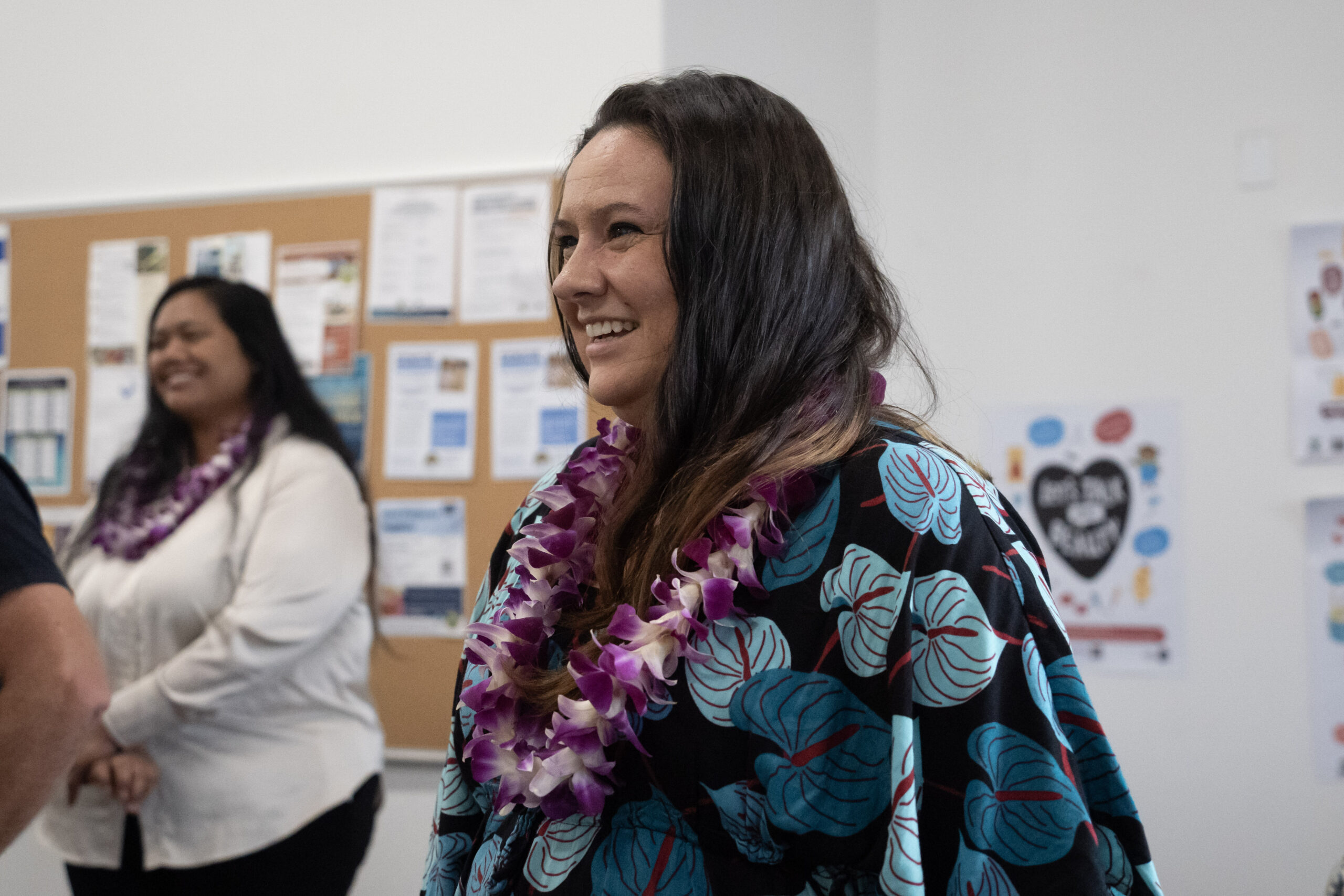
But in a market where the median price of a home was $1.2 million as of October, and fire survivors are facing deadlines to find more secure housing situations, Tamayose said timing is critical. ‘Ohana Hope Village is a temporary project, as are some of the federally funded housing projects in Lahaina, and support for survivors living in subsidized units is set to expire in February unless the federal government decides to extend it.
“I understand where they’re coming from, and I appreciate the caution,” Tamayose said. “But they also have to understand … when families are going through the motions and it’s moving forward, if it’s taking a lot of delay like that, families can lose opportunities.”
Dacuycuy got lucky. The sellers stuck it out because they wanted the family to get the home, and because of the prospect that they would have funding through the homebuyers’ program, said Schwabenland, who attended the small ceremony on Monday to see Dacuycuy get his shopping letter.
The family thanked the realtors and the program specialists for making it happen. Tamayose said the program and the downpayment they’d be able to provide “made all the difference of helping them qualify for the impossible.”
“It is very easy to get discouraged, but I think we all kept our faith and we kept in communication and we kept at it,” said April Saretsky of Keller Williams Realty, who represented the buyers.
When asked what the county would do if a buyer came up against a deadline like Dacuycuy did, Smith said “we’ll work as fast as we can to meet those deadlines.” He said the people working with the program are all locals who have “a direct connection some way or another to the fire” and understand the need to move quickly.
“I don’t see a scenario where we don’t move as fast as possible to help folks get to a home,” Smith said. “I mean, we are in a housing crisis, we all know that. And we know this program is one of the solutions, just one of them.”
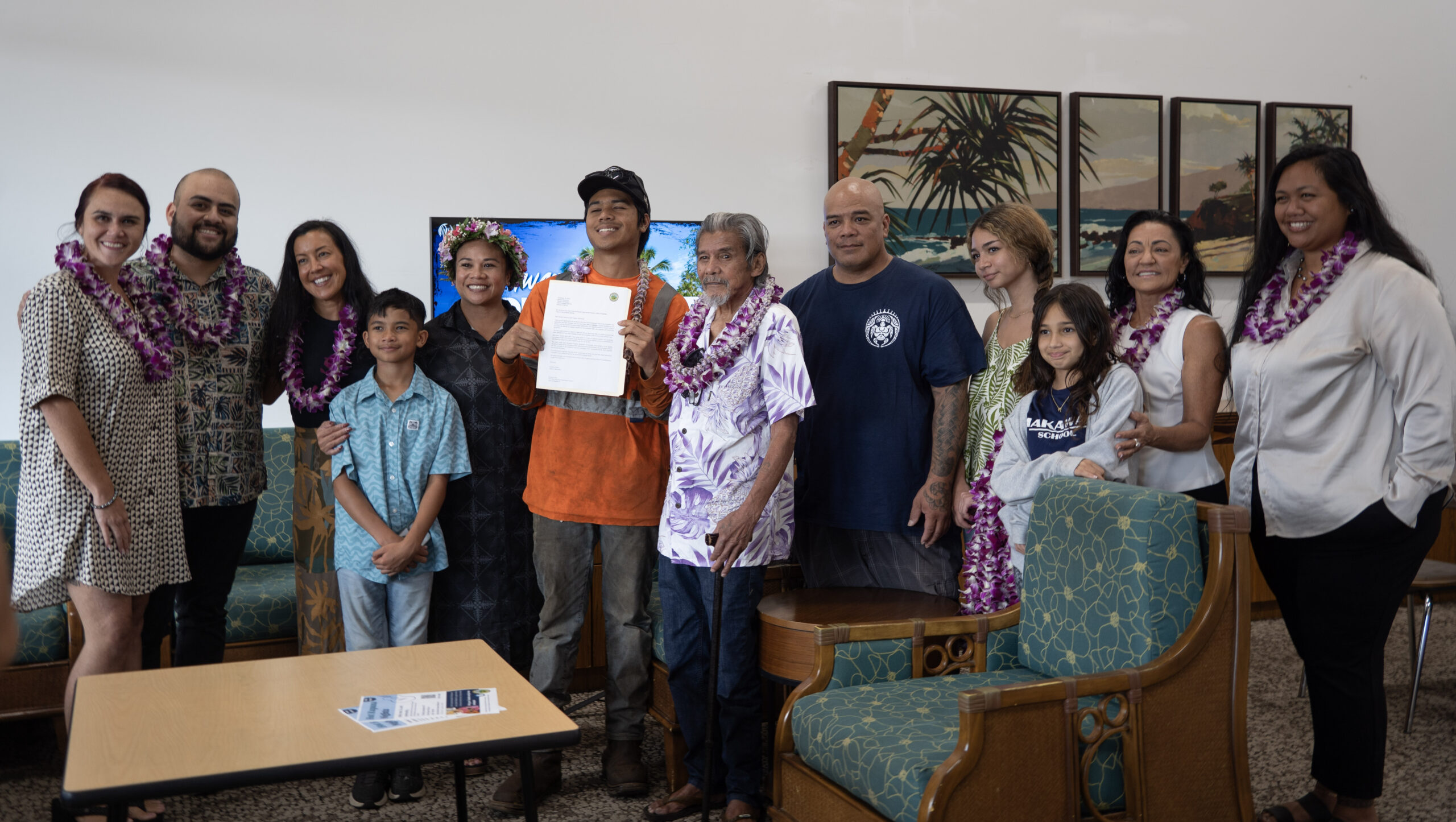
Two other shopping letters have been issued in addition to Dacuycuy’s. Smith said the county will be awarding future letters in batches, “so we’re not going to flood the market” with hundreds of homebuyers right away. And, with prices coming down, “it seems to be a good time,” he said.
Saretsky agreed it’s “a bit more of a buyer’s market right now” due to uncertainties in the market.
Realtors Association of Maui data show that the median price of a single-family home on Maui was just under $1.25 million in October, a 3.1% decrease from a median of nearly $1.29 million in October 2024. There are more listings and closed sales than there were at the same time last year, and a greater overall inventory of homes.
Condos have taken an even bigger tumble, falling from a median sales price of $920,000 last year to $625,750 this year, a 32% drop that’s come at a time when Maui County is considering a bill to phase out more than 7,000 short-term vacation rentals to create more housing. There are more listings and inventory but fewer sales, and condos are spending more time on the market than they did last year.
Sutton said they hope to have a preliminary review of everyone’s income and their basic eligibility information done before the end of the year. That doesn’t mean all shopping letters will be issued by then, but the county wants to have an idea of the number of people who will be served through the program.
“Every individual’s case is unique. Everybody’s in a different stage of their mortgage readiness and property readiness, etc.,” Sutton said. “So it does take a little bit of time to evaluate everybody’s individual circumstances and find a path forward for them through these programs.”
Dacuycuy and his grandson still have to complete steps with their lender and the county, including the environmental review process, before they can close on the purchase and get the keys to their first owned home.
Treyson Tamayose recently got his commercial driver’s license and hauls things like dirt and paving materials for T.J. Gomes Trucking. Pretty soon, he might be hauling cold beers for his grandpa on football Sundays in the house they share. He said he’s “thankful and excited” at the chance to be a homeowner and hopes to adopt a Border Collie puppy once they have their own place.
“Good things can happen when the right people come together and do what is right,” Dacuycuy said.

